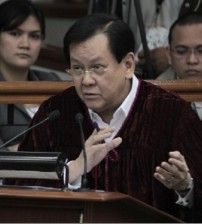Senator Sergio “Serge” Osmeña III yesterday asked the Senate blue ribbon committee to investigate the P111-billion President’s Bridge Program implemented during the term of former President Gloria Macapagal-Arroyo.
In a privilege speech, Osmeña said that irregularities stemming from the program could qualify it as “the grandmother of all scams” under the Arroyo administration.
Osmeña said the ZTE-NBN telecommunications deal that was investigated during that administration only cost P13.7 billion, while the NorthRail contract that was also questioned then only amounted to P21 billion.
He said the P111 billion was the total amount of 14 bridge contracts that were misrepresented “as having been funded through Official Development Assistance (ODA) concessional financing from such countries as the United Kingdom and France.”
“These P111-billion serial scams are eight times the ZTE contract and five times the NorthRail contract… This is the grandmother of all scams,” he added.
Five gov’t agencies
Aside from Arroyo, Osmeña said that “key officials from at least five government agencies” formulated a “highly complex scheme” that raised the prices of the bridges way beyond what was on the market.
The senator said Arroyo “misrepresented” the bridge program by tagging it as an ODA project. This allowed her to justify the decision to forego a public bidding, he said.
“She even issued two executive orders which overrode the provisions of the Government Procurement Act and other laws which mandate a public bidding even for ODA-funded projects,” Osmeña said.
“Mrs. Arroyo must explain to the Filipino people these very anomalous series of contracts that they forged with foreign companies. She and her cohorts could be held liable for plunder because this involves P111 billion in people’s money,” he said.
Under the law, plunder involves irregularities in government projects or transactions valued at P50 million or more. It is a nonbailable offense.
Osmeña said the actual cost of the projects was jacked up between 16 to 21 percent.
“That amounts to roughly P20 billion which could have built all the classrooms that Filipino children have been needing so badly,” the he noted.
